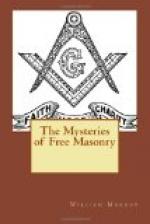that he that humbleth himself shall be exalted; stoop
low, brothers, stoop low!” The candidates seldom
pass the first pair of hands, or, in other words,
the first arch, without being so far humbled as to
be very glad to support themselves on all fours.
Their progress may be imagined to be very slow; for,
in addition to their humble posture, they are obliged
to support on their backs the whole weight of the
living arches above. The conductor, to encourage
them, calls out occasionally, “Stoop low, brothers,
stoop low!” If they go too slow to suit the
companions, it is not unusual for some one to apply
a sharp point to their bodies to urge them on; the
points of the pasteboard crown answer quite well for
this purpose. After they have endured this humiliating
exercise as long as suits the convenience of the companions,
they pass from under the living arches. The candidates
next receive the obligation, travel the room, attend
the prayer, travel again, and are shown a representation
of the Lord appearing to Moses from the burning bush.
This last is done in various ways. Sometimes
an earthen pot is filled with earth, and green bushes
set around the edge of it, and a candle in the centre;
and sometimes a stool is provided with holes about
the edge, in which bushes are placed, and a bundle
of rags or tow, saturated with oil of turpentine,
placed in the centre, to which fire is communicated.
Sometimes a large bush is suspended from the ceiling,
around the stem of which tow is wound wet with oil
of turpentine. In whatever way the bush is prepared,
when the words are read, “He looked, and behold,
the bush burned with fire,” etc., the bandage
is removed from the eyes of the candidates, and they
see the fire in the bush,[15] and, at the words, “Draw
not nigh hither; put off thy shoes,” etc.,
the shoes of the candidates are taken off, and they
remain in the same situation while the rest of the
passage is read to the words, “And Moses hid
his face; for he was afraid to look upon God.”
The bandage is then replaced, and the candidates again
travel about the room, while the next passage of Scripture
is read. [See Lecture.] At the words, “And break
down the walls of Jerusalem,” the companions
make a tremendous crashing and noise, by firing pistols,
overturning chairs, benches, and whatever is at hand;
rolling cannon balls across the floor, stamping, etc.,
etc., and in the midst of the uproar the candidates
are seized, a chain thrown about them, and they are
hurried away to the preparation room. This is
the representation of the destruction of Jerusalem,
and carrying captive the children of Israel to Babylon.
After a short time the proclamation of Cyrus is read,
the candidates are unbound, and start to go to Jerusalem,
to assist in rebuilding the temple. The candidates,
still hoodwinked, are brought into the Chapter, and
commence their journey over the rugged and rough paths.
They are literally rough paths, sticks of timber framed




